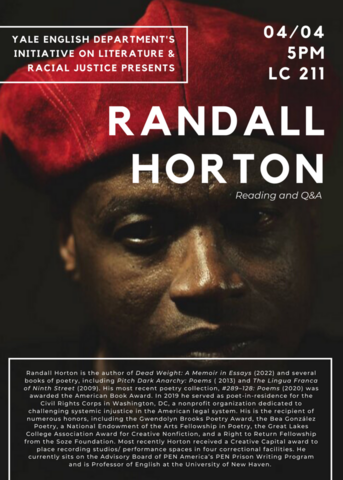Randall Horton gives Yale talk on writing and incarceration
The University of New Haven Professor read excerpts from his recent works surrounding identity and the prison industrial complex.

Courtesy of the Yale English Department
Last Monday, author and University of New Haven professor Randall Horton spoke to Yale students and faculty about his most recent works involving his experiences while incarcerated.
Horton is an author of memoirs and several books of poetry. He often writes about incarceration, drawing on his own experience in prison. He is the recipient of numerous writing honors, the most recent being a Creative Capital award, which provided him a grant to place recording studios or performance spaces in four correctional facilities. Horton is a professor of English at the University of New Haven, and he is the first tenured professor at the university to have been formerly incarcerated.
English professors Derek Green and Stephanie Newell organized the event as part of the English department’s ongoing Literature & Racial Justice Initiative, which looks to “highlight the questions of race and resistance, and focuses on the ways that creative writers, performers, critics, and readers have shaped histories of racial justice and empowerment over the centuries.” Horton’s talk was the Initiative’s first in-person event of the school year.
“Most of my students never could have imagined the concept of me, and so, I think the many experiences I’ve had on this journey has allowed me to teach from a different lens,” Horton said in an interview.
During Monday’s talk, Horton addressed his life before becoming a writer, talking about his experiences as an unhoused and incarcerated person. He read excerpts from his works “Hook: A Memoir” and “{#289-128},” both titles referring to names Horton was called while incarcerated. Horton also read from “Dead Weight: A Memoir in Essays” (2022).
Horton spoke candidly about his previous felony convictions. He described how he now uses his writing to push back against long-held views about people who have been incarcerated, as well as naming conventions such as “ex-convict.”
“When discussing how we talk about these dangerous markers of identity…[they] recriminalize someone that has supposedly paid a debt to society, and yet that debt seems to never be paid in full,” Horton told the News.
Horton also spoke about the occupational struggles he faced as a result of being formerly incarcerated, despite his viewing of his past and his present as separate parts of his identity and life. Due to Horton’s record of imprisonment, applying for a job became more difficult, requiring countless letters of recommendation from his previous employer. Horton described his hiring manager as “impressed” by the number of people vouching for his employment, revealing just how much a permanent record of past incarceration de-incentives hiring even qualified applicants.
“It can be refreshing to hear a voice — at Yale — that doesn’t have the traditional background,” Cynthia Lin ’25, who attended the event, said.
Green reiterated Lin’s sentiments, noting that the English department’s Literature & Racial Justice Initiative hopes to keep inviting speakers of varied backgrounds to come to Yale.
“We plan to keep moving forward, creating spaces for voices like Randall Horton’s — writers and thinkers who challenge and inspire us,” Green said.
Students interested in getting involved in the initiative can visit the English Department’s Diversity, Equity and Inclusion page, or contact the DEI committee directly.







